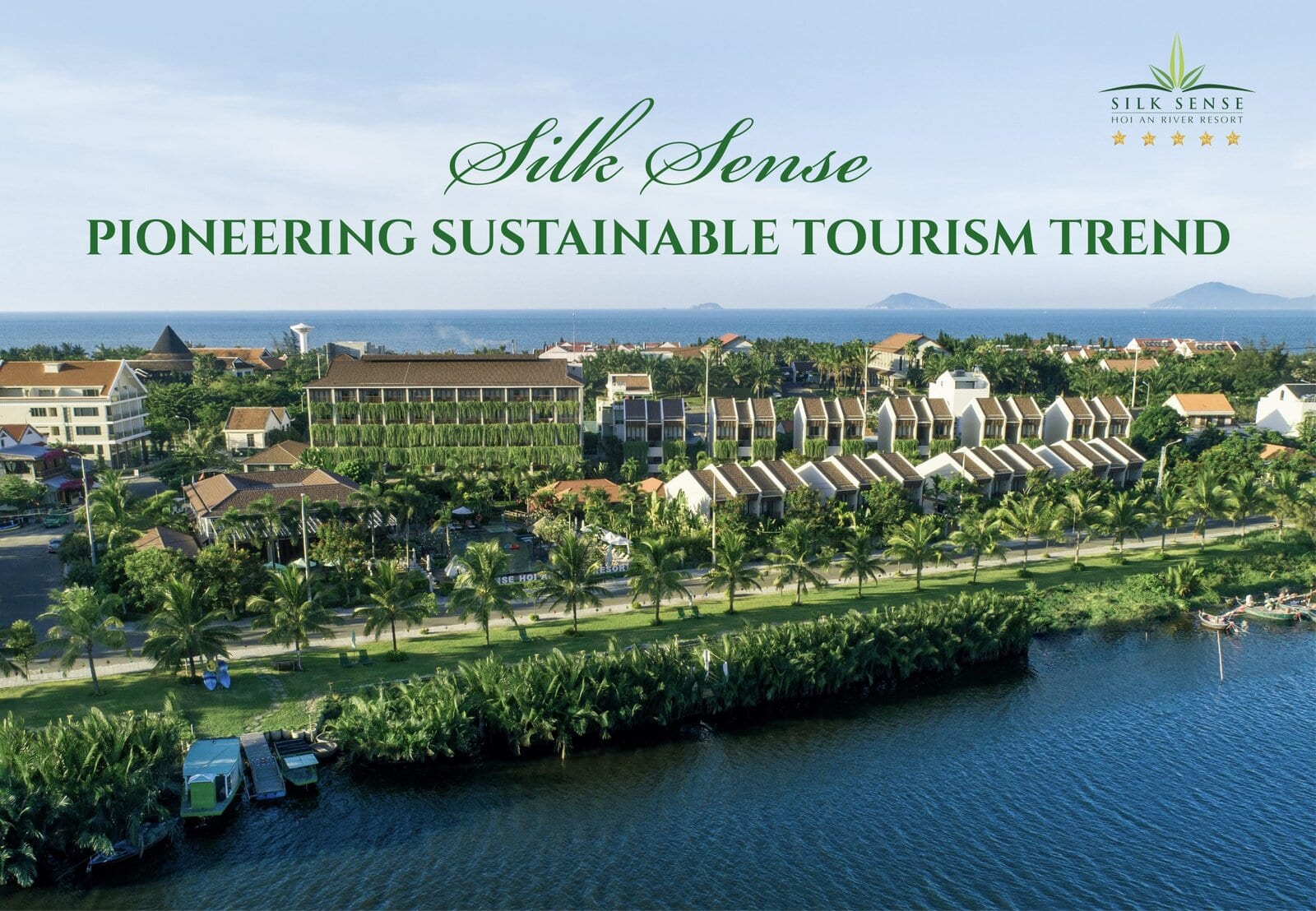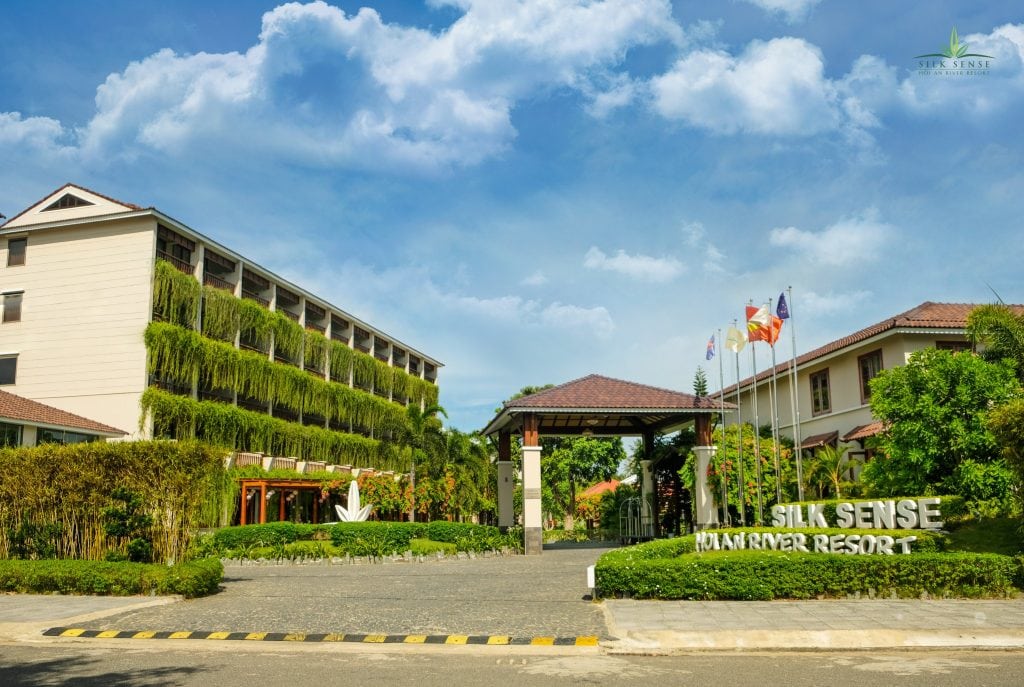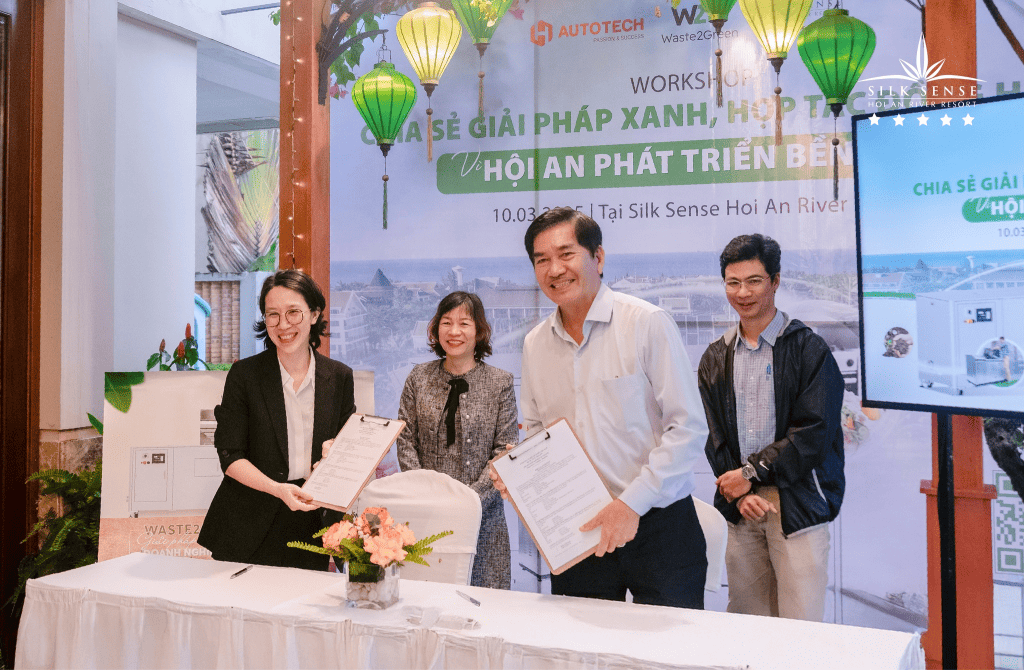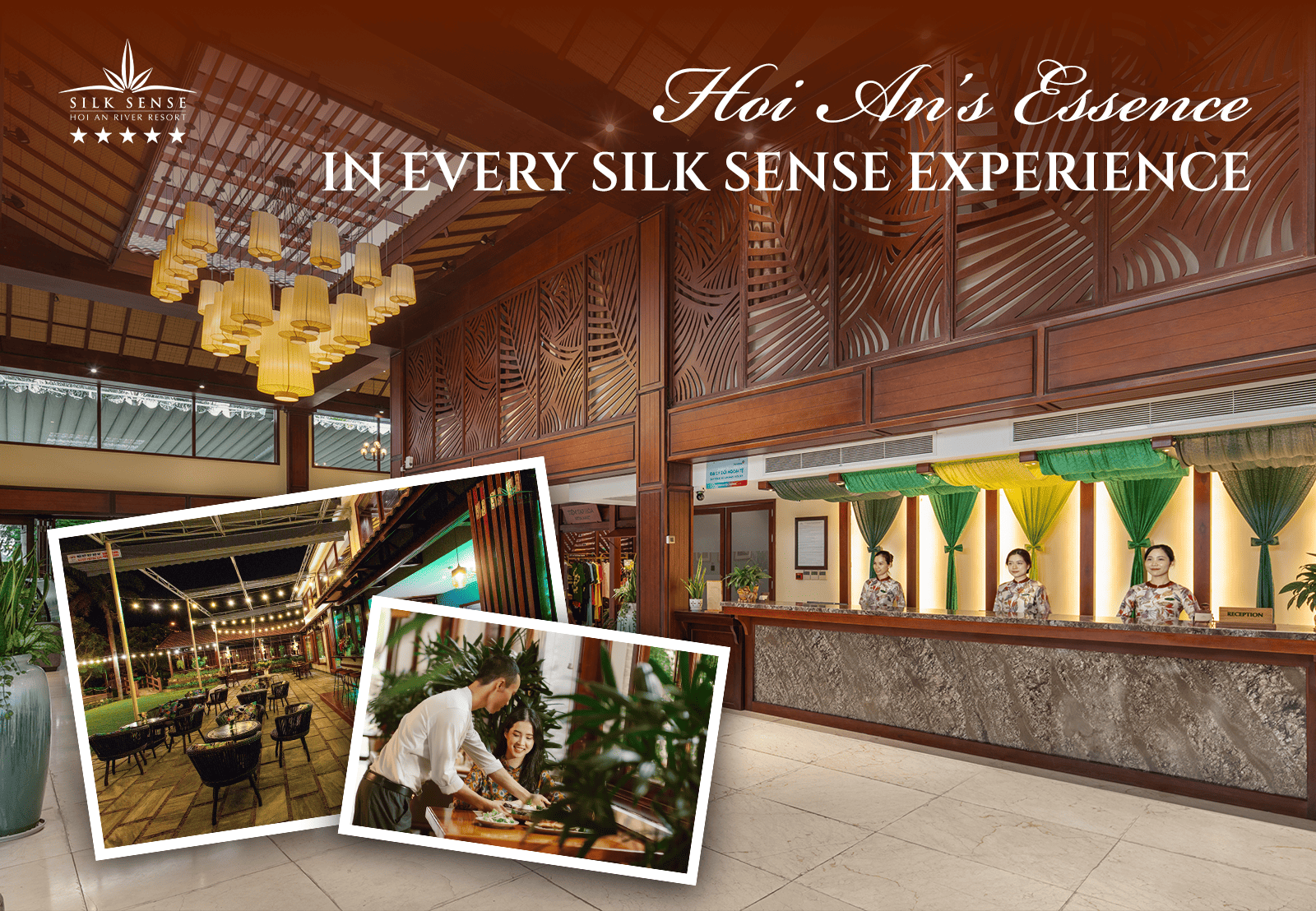Silk Sense Hoi An – A Leading Green Destination for Sustainable Tourism
sefa media | 19/03/2025

Amid growing environmental challenges, sustainable tourism has become a crucial topic more than ever. Travelers today seek beautiful destinations and also experiences that connect with nature and demonstrate environmental responsibility. Silk Sense Hoi An River Resort is one of the pioneering resorts embracing a sustainable tourism model, offering a green space right in the heart of the ancient town.
The Global Trend of Sustainable Tourism
Faced with the severe impacts of climate change, environmental pollution, and tourism overload, the trend of sustainable tourism is gaining significant global attention. Countries, travel businesses, and tourists are gradually changing their awareness and behavior to pursue more responsible travel experiences that can ensure economic growth while protecting natural resources and preserving cultural identities. Many destinations are implementing strong measures to control tourist numbers, reduce carbon emissions, encourage the use of renewable energy, and promote ecotourism while supporting local communities.
One notable trend is carbon-neutral tourism, with airlines like KLM and British Airways launching carbon offset programs that allow passengers to contribute to reforestation or renewable energy projects. Luxury resorts such as Six Senses, Soneva, and Banyan Tree are leading the way in using organic food, recycling water, and eliminating plastic waste. Moreover, in response to overtourism at popular sites, countries like Italy, Peru, and the Netherlands have introduced visitor control measures to protect heritage and the environment. Ecotourism is also encouraged in many nature reserves, such as Costa Rica, New Zealand, and Bhutan, where governments and tourism businesses commit to ecosystem conservation and sustainable development. The combination of environmental policies, green technology, and tourists’ awareness is shaping a more sustainable and responsible tourism industry for the future.
Beyond environmental factors, sustainable tourism also emphasizes cultural preservation and community support. Community-based tourism and homestays are gaining popularity, allowing travelers to experience the authentic lives of locals while providing stable income for communities. International organizations like Ethical Traveler publish lists of destinations with strong cultural conservation policies to encourage responsible tourism. Some world heritage sites like Kyoto (Japan), Hoi An (Vietnam), and Fez (Morocco) are implementing strict preservation measures, such as limiting motor vehicles and regulating construction materials to maintain traditional architecture.
Why Sustainable Tourism is becoming a trend
The rapid growth of the tourism industry over the past decades has brought significant economic benefits, creating millions of jobs and boosting the development of destinations worldwide. However, the negative side of mass tourism is becoming increasingly apparent, especially the phenomenon of overtourism, where destinations are overwhelmed by excessive visitor numbers. Sustainable tourism has emerged as an essential solution, enabling tourists to enjoy memorable experiences while protecting the environment and preserving cultural heritage.
Protecting natural resources and the environment
Scenic natural landscapes attract travelers, but uncontrolled exploitation has left many places severely degraded. Plastic waste litters beaches, untreated wastewater flows directly into oceans, and emissions from transportation are making the air in many tourist cities suffocating. Popular destinations like Bali (Indonesia) and Boracay (Philippines) have temporarily closed to address pollution issues, while coral reefs in Thailand and the Maldives are losing their colors due to climate change and uncontrolled diving activities. In places like Venice (Italy) and Santorini (Greece), excessive resource extraction for tourism has led to severe freshwater shortages.
Given these risks, sustainable tourism is the optimal solution to balance economic growth with environmental protection. Resorts like Six Senses and Banyan Tree are pioneers in green tourism models, using renewable energy, reducing plastic waste, and recycling wastewater. These initiatives help conserve nature and provide guests with cleaner and more meaningful travel experiences.
Preserving and promoting local cultural values
Each destination carries its unique cultural characteristics, but excessive tourism often leads to the loss or commercialization of these cultural identities. Many ancient towns in Southeast Asia are losing their serene charm as they transform into commercial hubs for tourists. In some areas, indigenous communities are no longer respected but instead exploited as “tourist products,” altering their traditional culture to fit market demands.
Beyond cultural degradation, mass tourism disrupts local communities. Real estate prices in tourist cities skyrocket, forcing many families to leave their homes to make way for businesses. This disruption weakens community bonds and turns many areas into lifeless tourist spots lacking local essence.
To achieve sustainable development, many countries are implementing community-based tourism models, allowing tourists to experience local culture authentically. These models provide a stable income for residents while preserving traditional values naturally, free from commercialization.
Meeting the needs of modern travelers
Today’s travelers crave deeper experiences, seeking to connect with nature, local people, and contribute positively to the places they visit, rather than just checking in at famous landmarks. As a result, more travelers are willing to participate in environmental protection activities, from beach clean-ups to forest planting and choosing eco-friendly tours.
Tourism businesses are also adapting to this trend. Hotels and resorts with sustainable tourism certifications are increasingly preferred, and booking platforms like Booking.com and Airbnb now include eco-friendly accommodation search features. This shift illustrates that sustainable tourism is a long-term, profitable business strategy.
Global policies to promote Sustainable Tourism
Sustainable tourism has become a key goal in the development policies of many international organizations and governments worldwide. The United Nations World Tourism Organization (UNWTO) has issued recommendations to help countries develop tourism while protecting the environment and communities. The Global Sustainable Tourism Council (GSTC) has established international standards for businesses and destinations to achieve sustainable tourism certification, attracting more responsible travelers.
Many governments are actively implementing policies to reduce the negative impact of tourism, from limiting the number of visitors to sensitive sites and encouraging the use of renewable energy to strict regulations on cultural heritage conservation. These policies help protect the environment and ensure that tourism can develop sustainably, benefiting both tourists and local communities.
Silk Sense Hoi An River Resort – A Pioneer in Sustainable Tourism
In the heart of Hoi An, where cultural heritage meets nature, Silk Sense Hoi An River Resort is an ideal stopover, a pioneer in the journey of developing green tourism.
Silk Sense Hoi An River Resort focuses on using clean fuel, integrating solar energy systems to minimize environmental impacts. Thanks to that, areas in the resort such as rooms, restaurants, and spas are all operated in an energy-saving direction, ensuring comfort for visitors while still being friendly to nature. Prioritizing renewable energy sources helps optimize resources and demonstrates Silk Sense’s strong commitment to a green future.

Recently, on March 10, Silk Sense organized the Workshop “Sharing Green Solutions – Partnership for Sustainable Development in Hoi An” with the participation of representatives of local management agencies, tourism businesses and pioneers in environmental technology. At the event, Silk Sense Hoi An River Resort and AutoTech Vietnam Joint Stock Company As part of the event, Silk Sense Hoi An River Resort and AutoTech Vietnam Joint Stock Company signed a partnership agreement to implement the Waste2Green (W2G) technology, a solution that helps convert organic waste into compost within 24 hours. This not only helps reduce the amount of waste but also limits the use of chemical fertilizers, promoting a sustainable agricultural model right on the resort grounds. This is one of Silk Sense’s important steps in the journey towards zero-waste tourism in Hoi An.

Silk Sense Resort bears the mark of Hoi An with its sophisticated architecture, harmoniously combining ancient features and modern amenities. The yin-yang tiled roof, yellow walls, lanterns and wooden materials create a resort space that is both luxurious and close to nature. The design maximizes natural light, combined with energy-saving solutions to aim for sustainability. Vivid cultural experiences such as cooking classes and Tet markets recreating ancient Hoi An are clearly recreated, thereby helping visitors better understand the local culture through every small detail. In addition to aiming for sustainable development within the resort, it also joins hands to support the local community. The resort prioritizes cooperation with local artisans, farmers and businesses to bring quality products, while creating stable jobs for Hoi An people. One of the special highlights at Silk Sense is Caman Village – a 4,000m² organic garden, where vegetables and herbs are grown naturally. All ingredients harvested here are used in the resort’s kitchen, contributing to promoting clean agriculture and supporting farmers to develop sustainably. In addition, Silk Sense also organizes cultural events and craft fairs to promote local products, while creating a space for exchange between tourists and the community.
Silk Sense Hoi An River Resort is an ideal destination for those looking for a classy resort space amidst peaceful nature. With harmonious architecture and attentive service, this place is a typical model for sustainable tourism in Vietnam. The resort applies many green initiatives such as using renewable energy, limiting plastic waste and prioritizing environmentally friendly materials. Choosing to stay at Silk Sense, visitors can both enjoy a memorable vacation and contribute to protecting Hoi An’s natural landscape in the most meaningful way.
For more information and advice, please contact us via:
(T) +84 235 3754 999
(E) reservation@silksenseresort.com
(F) https://www.facebook.com/silksenseresort
(IG) @silksenseresort
(A) 01 Dong Da Street, Cam An Ward, Hoi An City, Quang Nam Province, Vietnam












